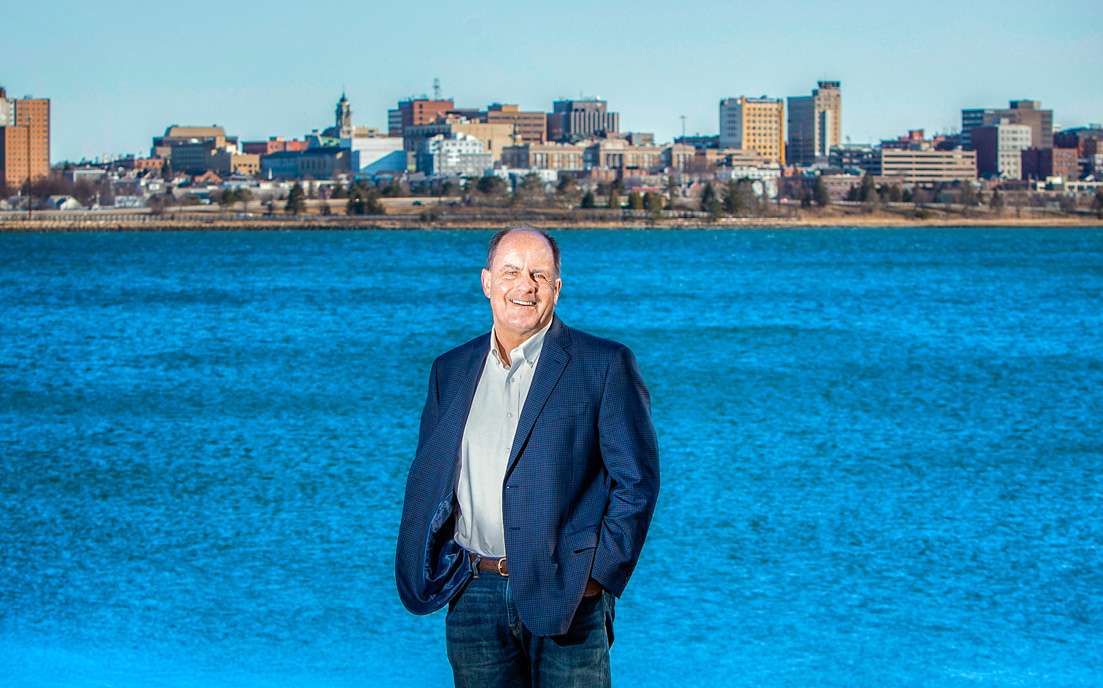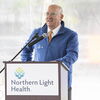
Processing Your Payment
Please do not leave this page until complete. This can take a few moments.
Retirement rollovers for business have tax advantages — but beware
 Photo / Tim Greenway
Bill and Mary Ann Hinko used a funding vehicle called “rollover for business startups,” or ROBS, to buy the James Place Inn Bed & Breakfast in Freeport
Photo / Tim Greenway
Bill and Mary Ann Hinko used a funding vehicle called “rollover for business startups,” or ROBS, to buy the James Place Inn Bed & Breakfast in Freeport
In 2018, Bill and Mary Ann Hinko were thinking about changing careers.
They lived in Virginia. She was an elementary school teacher and he was an accountant who worked for the same company for 31 years.
Innkeeping seemed like an attractive second act. They took an “aspiring innkeepers” course and looked at dozens of inns for sale. Last summer, they fell in love with the James Place Inn Bed & Breakfast in Freeport. The price was just over $1 million.
The couple didn’t want to bankroll the purchase with a loan. Through the course of their property search, Bill Hinko learned about an alternative funding vehicle, called “rollover for business startups,” or ROBS.
“We didn’t have a bag of money lying around,” says Hinko. “We paid off our home mortgage five years ago and I hated the idea of getting back into a loan. We looked around and there was this funky ROBS vehicle.”

The investment vehicle allows investors with 401(k) plans and Individual Retirement Accounts to use the funds to buy a business and pay for start-up costs. A four-step process allows the account holder to access the cash without paying early withdrawal penalties or taxes. It’s becoming increasingly prevalent among retirement account holders. Many have spent decades in the corporate world, aren’t ready to retire, but are looking for that “second act” business.
“We’re happy with the choice and it hasn’t been a painful implementation,” says Hinko. “It isn’t simple, but it is reasonable.”
A shelter from the storm
As it abruptly turned out in this time of crisis, which is battering the hospitality industry, among others, there’s an extra plus.
“I’m grateful not to have to worry about debt service if we do wind up having a down year,” Hinko says.
The recent stock market meltdown demonstrates timing is everything.
“Unfortunately, the market volatility may put a damper on ROBS for a bit, as folks will not want to lock in losses,” says Jerome Gamache, an attorney who specializes in ROBS at Ainsworth, Thelin & Raftice in South Portland.
How it works
Setting up a ROBS is a four-step process, says Dallas Kerley, president and CEO of North Wales, Pa.-based Benetrends Inc.
- Create a C corporation, a structure that meets certain IRS guidelines to provide tax benefits.
- Design a new retirement plan for the corporation.
- Roll over current retirement plan funds into the new corporation’s retirement plan.
- The new retirement plan is then able to invest in the newly formed C corporation by buying stock in the corporation. The sale of stock provides capital to start, buy or recapitalize a business or franchise.
Benetrends’ founder, Leonard Fischer, is the original architect of the vehicle, says Kerley. The idea was to allow people thinking about owning a small business or franchise to use the money in their retirement plans to fund the business without debt, taxes or penalties. Since Benetrends was founded in 1983, it has helped over 17,000 small business owners implement ROBS. In Maine, Benetrends currently has 47 clients, all lodging owners.
Companies like Benetrends administer the plan once it’s created, performing tasks such as filing annual tax forms.
Typical clients are age 45 to 60.
“They have a retirement plan,” says Kerley. “A lot of times it’s a lifestyle change. They’re in corporate America and they say, ‘I’m going to become my own boss.’”
The vehicle allows new business owners to take a salary, even if the business isn’t up and running yet.
“They can get a salary, pay their mortgage and car payments,” Kerley says. “That can eliminate some of that stress when starting a new business.”
Buyers often use ROBS as one part of a funding mix, which includes other sources like bank loans and the sale of other property. Typically, it takes 15 to 20 business days from the start of setting up a ROBS to having access to the cash, says Kerley. That compares with 60 to 90 days to get a small-business loan.
Speed is beneficial.
“If they want to make a bid on a property, if they can get their cash sooner, they can get their offer in sooner,” says Kerley. “Some people do a rollover so they can have cash in hand, then they shop for a business. You want to be able to pull the trigger fast.”
It’s beneficial to sellers, as well.
“They don’t have to take the property off the market only to find you don’t qualify for a loan,” says Kerley.
It costs about $5,000 to set up a ROBS. A yearly management fee is about $1,700.
Not free money
There are also negative considerations.
“I’d love to say everybody is 100% successful, but people do go out of business even if they utilize this plan,” says Kerley.
In that case, the client loses not only his business but the retirement money that went into it.
“I try to make sure clients realize it’s not free money,” says Gamache at Ainsworth, Thelin & Raftice. “They’re taking that money out and putting it into an active business. There’s a risk if the business doesn’t do well.”
For Hinko and his wife, the main consideration was that they had to get comfortable with the fact that they were investing their retirement savings in their own ability to make their business a success and generate enough of a return to allow them to retire later on.
Hinko used another ROBS provider, Guidant Financial in Bellevue, Wash. He paid about $5,000 up front.
“It seems like a lot when all you’re getting is paperwork,” Hinko says. “But there are things they’re doing on the back side. I said, Yes, it’s probably worth the time and the effort for them to do it, as opposed to me doing it and maybe doing it wrong.”
The process is conducted by phone and online, he explains.
Once the rollover and stock purchase in the new corporation were completed, Hinko was able to write a check to the seller of the James Place Inn.
“ROBS can be a powerful tool in purchasing an inn or hospitality property,” says John McCarthy of Legacy Properties Sotheby’s International Realty, the Hinkos’ broker on the Freeport deal. “What I noticed most about the ROBS was the excitement and determination created by allowing the 401(k) owner to take part in their own destiny. Buyers felt that they wanted to start using their investments for a change of lifestyle and a second career in Maine. Many spent years at a classic 9-to-5 office environment with little control over their 401(k). It was ‘money for a rainy day.’”

“It opens up an enormous amount of liquidity that people didn’t realize they can put to work,” says Rick Wolf, partner and owner of The B&B Team in Kennebunk. ROBS “has become a very helpful tool to some buyers who could otherwise not raise the capital needed to purchase, or to purchase what they would really like,” says Dana Moos, director of the lodging and hospitality brokerage at Swan Agency Sotheby’s International Realty. “I’ve had at least three or four buyers use it in recent years.”
But the recent stock market meltdown demonstrates timing is everything. Moos has been working with a client looking to buy a lodging property. The client performed the rollover shortly before the meltdown and has the full cash value of the original 401(k) on hand, she explains.
Clients who haven’t completed the ROBS process have a decision to make in the current climate, particularly if they hadn’t yet shifted their funds to short-term conservative products, says Steven Bosinger, a certified public accountant with Austin Associates CPAs in Auburn.
“Anyone who’s in a position where it would be difficult to backtrack out of this scenario should have changed their investment sufficiently that this market downturn should not have impacted them greatly,” Bosinger says. “Anybody who was just thinking about this sort of transaction has said suddenly, ‘Now is not a good time. We’ll table this discussion until our investments are back up to where we’re comfortable liquidating.’”
In the case of Roy and Sue Forsberg, in 2013 they left careers in software engineering and used a commercial loan and ROBS to buy and improve Wolf Cove Inn in Poland.
“We thought long and hard about that,” says Roy Forsberg. “The conclusion was, ‘I feel better about managing my own retirement myself, by running my own business, than I do putting it in the hands of some mutual fund manager on Wall Street and letting the markets do what they may with my money, and on top of that having a percentage skimmed off the top by those firms.’
The purchase was $918,000 and the inn, at the time, was doing $130,000 in revenue. Now the value is $2.95 million, revenues last year were $660,000, and the return on investment has been at least equal to the stock market, he says.
“And now the market is tanking,” he adds. Like the hospitality industry overall, his business is suffering, too, as cancellations pour in. “But when people start booking again, our business will be right back where it was, whereas the stock market will take a while to get back to where it was.”










0 Comments